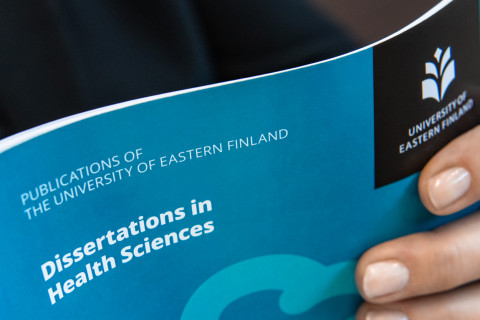The doctoral dissertation in the field of Molecular Medicine will be examined at the Faculty of Health Sciences at the Kuopio Campus. The public examination will be streamed online.
What is the topic of your doctoral research? Why is it important to study the topic?
Diabetes mellitus is a complex metabolic disorder with rapidly increasing prevalence worldwide. It is estimated that by the year 2045 over 10% of the population will suffer from diabetes, but only every second person living with diabetes is aware of it. Therefore, diabetes and its complications are becoming an increasing economic burden for countries around the world. Diabetes, hypertension and atherosclerosis are major risk factors for cardiovascular diseases such as myocardial infarction and heart failure. To improve treatment strategies and to develop new therapies against cardiovascular complications of diabetes a better understanding of the interplay between diabetes and atherosclerosis is crucial.
What are the key findings or observations of your doctoral research?
In this doctoral thesis the mechanisms between diabetes and atherosclerosis leading to cardiovascular complications were studied.
Statins are commonly used drugs to lower cholesterol levels through upregulation of low-density lipoprotein receptor (LDLR). In the first study the effects of statin treatment on diabetes and atherosclerosis were studied. In a diabetic disease model lacking LDLR and overexpressing Insulin-like growth factor II (IGF-II) cholesterol was reduced by statin treatment without affecting glucose tolerance. Furthermore, extensive analysis of gene expression in the liver by RNA sequencing revealed specific downregulation of cholesterol and anti-inflammatory pathways.
Among many other diseases diabetes and hypertension are well known risk factors for heart failure. Heart failure is a clinical syndrome leading to myocardial dysfunction and it is a major health problem with increasing mortality rates around the world. Therefore, new treatment options are desperately needed. In the second study the role of IGF-II overexpression in atherosclerosis was elucidated during pressure overload induced hypertrophy and heart failure. The results of the study suggest a possible cardioprotective role of IGF-II in pressure overload induced hypertrophy and heart failure.
Diabetes can lead to a more aggressive and accelerated form of atherosclerosis, which is a chronic inflammatory disease where plaques are formed. Over time those plaques can reduce blood flow and become vulnerable leading to plaque rupture resulting in ischemic events. In the third study a newly developed disease model containing a mutation in the sulfonylurea receptor was used to study the interaction of atherosclerosis and diabetes. Diabetes increased plaque vulnerability with increased inflammation and NLRP3 inflammasome expression in this newly developed disease model.
What are the key research methods and materials used in your doctoral research?
This PhD thesis is an article-based thesis consisting of three publications, where cardiovascular complications are studied in the context of diabetes and atherosclerosis. In the thesis extensive methodologies to characterize the diabetic and cardiovascular phenotype as well as gene and protein expression analysis were used to achieve a better understanding on the underlying mechanisms between diabetes and atherosclerosis and to possibly develop improved treatments in the future.
The doctoral dissertation of Erika Gurzeler-Tiihonen, MSc, entitled Cardiovascular complications in diabetes - Functional and gene expression profiling in diabetic mouse models with atherosclerosis, will be examined at the Faculty of Health Sciences. The Opponent in the public examination will be Professor Jan Nilsson of Lund University, and the Custos will be Professor Seppo Ylä-Herttuala of the University of Eastern Finland.



